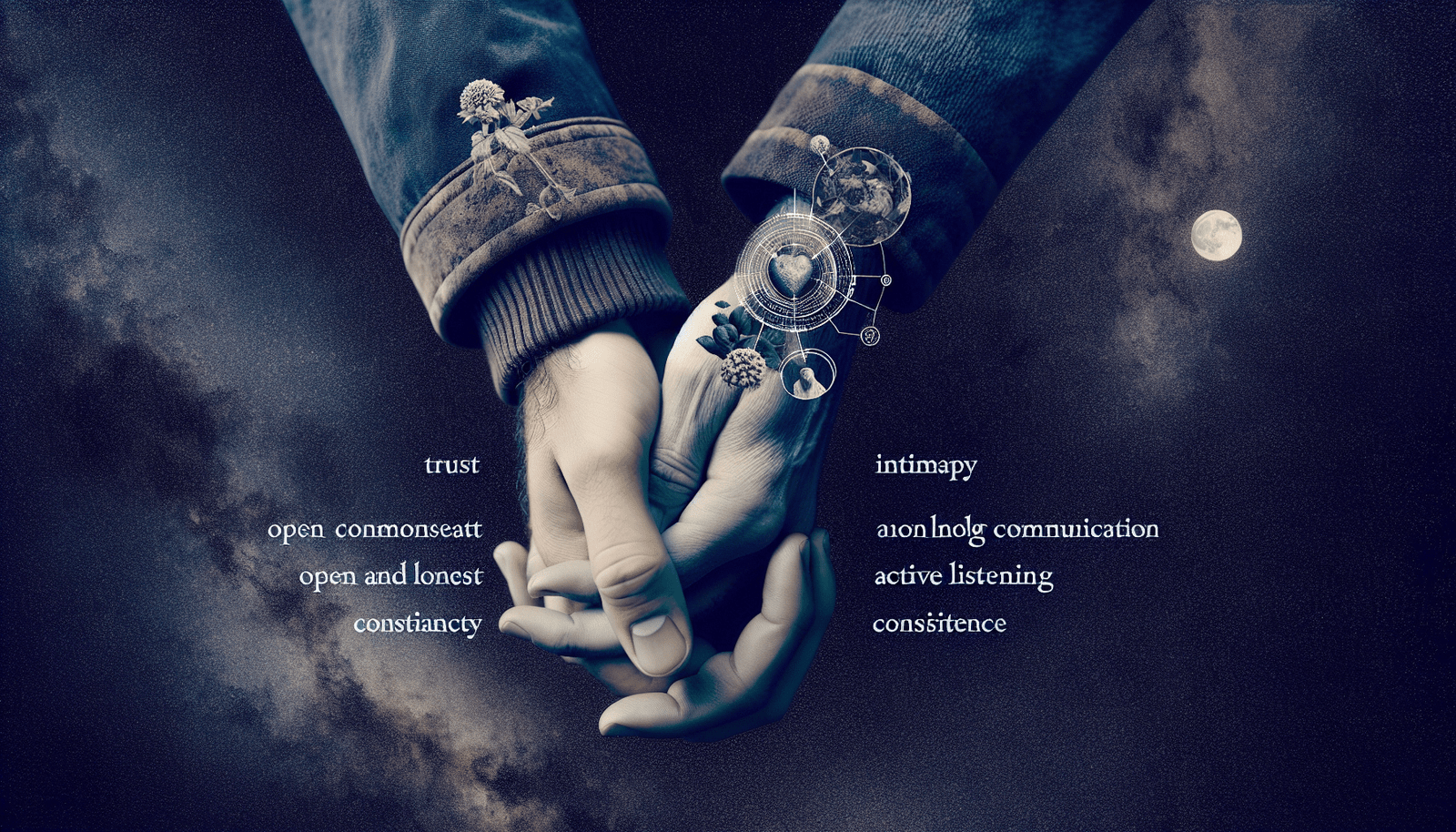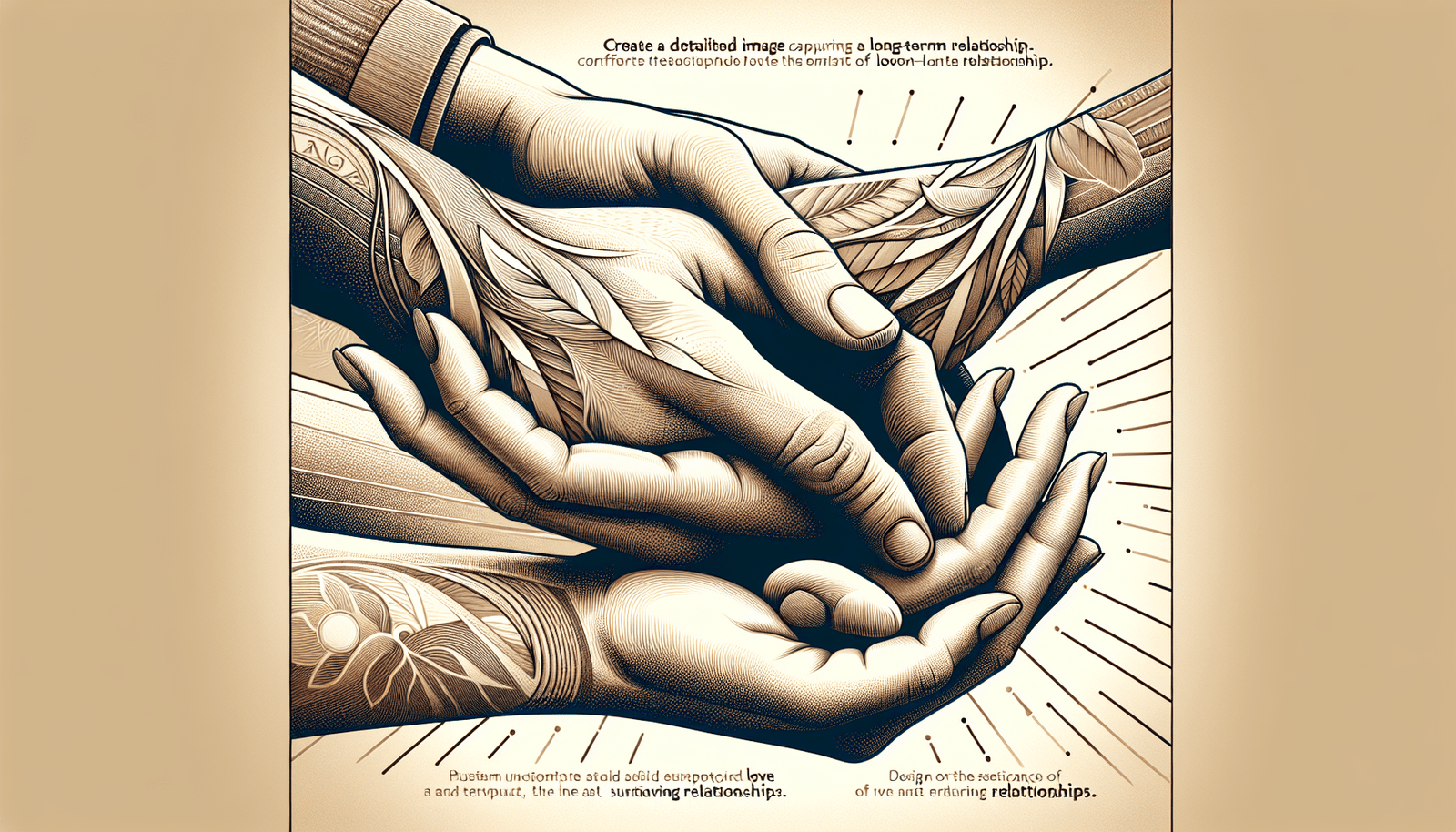Long-Term Relationships
Imagine a world where long-term relationships are the norm – where couples stand the test of time and build a strong foundation, year after year. In this article, you’ll explore the secrets to cultivating a successful long-term relationship, from effective communication to fostering trust and intimacy. Discover how you can create a lasting bond with your partner and navigate the challenges that come your way. Get ready to unlock the keys to a fulfilling and enduring love connection.
Importance of Long-Term Relationships
Long-term relationships hold a significant place in our lives, providing a sense of stability, support, and connection that is unique to these types of partnerships. Building and nurturing these relationships is essential for personal growth and overall well-being. Let’s explore why long-term relationships are so important.
Building Trust and Intimacy
One of the cornerstones of any successful long-term relationship is trust. Trust forms the foundation upon which all other aspects of the relationship are built. When you trust your partner, you feel safe to be vulnerable and open, allowing for the development of deep emotional intimacy. This intimacy creates a strong sense of connection, allowing you to truly understand and support each other.
Support and Stability
Long-term relationships provide us with an anchor in our lives. They offer the support and stability we need to navigate life’s challenges and uncertainties. Having a partner who is there for you through the ups and downs can be incredibly comforting and reassuring. Knowing that you have someone to lean on during difficult times can make all the difference in maintaining your overall well-being.
Shared Goals and Values
Long-term relationships allow you to build a life together, sharing goals and values that align with each other. When you and your partner are on the same page about what you want for your future, it becomes easier to work towards those goals together. Sharing common values also helps create a sense of harmony and understanding, fostering a deeper connection and compatibility within the relationship.
Challenges in Long-Term Relationships
While long-term relationships bring many benefits, they are not without their challenges. It’s important to recognize and address these challenges to maintain a healthy and thriving partnership.
Communication Issues
Communication is the lifeblood of any relationship. However, over time, communication issues can arise, leading to misunderstandings, conflict, and frustration. It’s crucial to develop effective communication skills and actively work on maintaining open and honest lines of communication. Regular check-ins, active listening, and expressing thoughts and feelings respectfully can help overcome communication hurdles.
Fading Passion
As time goes on, the initial spark and passion in a long-term relationship can naturally diminish. The busyness of life, responsibilities, and routines can make it difficult to prioritize romantic connection. However, it’s important to make conscious efforts to keep the flame alive. This can involve planning regular date nights, exploring new activities and experiences together, or simply finding small ways to show affection and appreciation for each other.
Routine and Monotony
The security and comfort that long-term relationships provide can sometimes lead to a sense of routine and monotony. While stability is essential, too much routine can lead to boredom and a lack of excitement. To combat this, it’s important to introduce variety and spontaneity into your relationship. Trying new things, pursuing individual interests, and keeping an element of surprise can help break free from the monotony and keep the relationship fresh and exciting.
Maintaining a Long-Term Relationship
Sustaining a long-term relationship requires conscious effort and commitment. Here are some key aspects to focus on to maintain a strong and healthy partnership.
Effective Communication
Continuously working on your communication skills is vital in a long-term relationship. This involves both expressing yourself honestly and listening attentively to your partner. Clear, open, and respectful communication helps to address any issues or concerns promptly, preventing them from escalating into larger problems. Regularly check in with each other to ensure that both partners feel heard and understood.
Quality Time Together
In the busyness of everyday life, it’s essential to carve out quality time with your partner. Make it a priority to engage in activities that both of you enjoy and that foster connection. Whether it’s going for walks, having dinner dates, or simply spending time engaging in meaningful conversations, dedicating undivided attention to each other deepens the bond and reinforces the relationship’s importance.
Keeping the Passion Alive
Maintaining a passionate connection is vital for the longevity of a long-term relationship. It’s important to keep the flame burning by engaging in activities that bring joy and excitement. This could involve surprises, romantic gestures, or exploring new experiences together. Keeping the passion alive requires creativity and effort, but it ultimately strengthens the bond and enhances the overall satisfaction within the relationship.
Enhancing Intimacy in Long-Term Relationships
Intimacy is the emotional and physical closeness between partners that deepens their connection. In a long-term relationship, nurturing and enhancing this intimacy is crucial. Here are some ways to enhance intimacy:
Emotional Connection
Emotional intimacy is built through open and honest communication, empathy, and understanding. Taking the time to understand your partner’s thoughts, feelings, and needs cultivates emotional closeness. Sharing your own vulnerabilities and fears fosters a deeper sense of trust and connection. Regularly expressing love and appreciation to your partner strengthens the emotional bond and creates a secure foundation for the relationship.
Physical Intimacy
Physical intimacy is an essential part of a long-term relationship. It encompasses more than just sexual intimacy; it also includes physical touch, affection, and cuddling. Making time for physical intimacy and being mindful of each other’s physical needs helps to maintain a strong connection. Remember that physical intimacy evolves over time, and quality is often more important than quantity.
Exploring New Experiences
Exploring new experiences together ignites excitement and novelty within a long-term relationship. Trying new activities, traveling to different places, or taking up interests as a couple opens up opportunities for personal growth and shared memories. Stepping out of your comfort zones together allows you to create lasting bonds and brings a sense of adventure into your relationship.
Preventing Relationship Breakdown
Even the strongest relationships can experience challenges that, if not addressed, may lead to breakdown. It’s crucial to be proactive in preventing these challenges from causing irreparable damage. Here are some strategies to prevent relationship breakdown:
Addressing Conflict
Conflict is a natural part of any relationship, but how it is addressed makes all the difference. It’s important to approach conflicts with empathy and an open mind, seeking understanding rather than trying to “win” an argument. Learning effective conflict resolution skills, such as compromise, active listening, and finding win-win solutions, can help prevent conflicts from escalating and damaging the relationship.
Maintaining Individuality
While sharing a life together, it’s essential to maintain a sense of individuality. Celebrating each other’s unique identities, personal interests, and hobbies fosters personal growth and self-fulfillment. Allowing space for individual pursuits while maintaining the connection within the relationship helps prevent feelings of suffocation or loss of identity.
Seeking Professional Help
In some instances, seeking professional help can be beneficial in preventing a relationship breakdown. A qualified therapist or relationship counselor can provide guidance, insights, and tools to navigate challenges and promote healthy communication. Seeking professional help shows a commitment to working on the relationship and can help identify and address underlying issues before they cause further harm.
The Role of Trust in Long-Term Relationships
Trust is a fundamental component of a successful long-term relationship. It forms the bedrock upon which the relationship is built. Let’s explore the importance of trust and how it impacts your connection over time.
Building Trust
Building trust requires honesty, consistency, and reliability. It involves keeping your word, being transparent, and demonstrating integrity. Over time, as trust is nurtured and established, partners feel secure and safe within the relationship. Building trust involves showing trustworthiness through actions and words, thus reinforcing the foundation of the partnership.
Rebuilding Trust
Trust can be broken due to various reasons such as betrayal, dishonesty, or past hurts. Rebuilding trust is a challenging but necessary process for a relationship to heal and grow. It requires open communication, commitment to change, and taking responsibility for past actions. Rebuilding trust involves demonstrating remorse, making amends, and consistently acting in trustworthy ways. It takes time and patience from both partners to fully restore trust.
Maintaining Trust
Maintaining trust in a long-term relationship involves ongoing effort and attention. It requires open and honest communication, keeping promises, and being reliable. Regularly checking in with your partner, being emotionally available, and actively listening help to nurture trust. Trust is not a one-time achievement, but rather an ongoing commitment to maintaining the foundation of your relationship.
Dealing with Routine and Monotony
Routine and monotony can gradually seep into long-term relationships, potentially dampening the excitement and creating a sense of stagnation. Here are some strategies to keep the relationship vibrant and engaging:
Spicing Things Up
Adding a touch of novelty and spontaneity to your relationship can help break free from the monotony. Surprise your partner with small gestures, plan surprise dates, or try new things together. Creating an element of surprise reignites excitement and keeps the relationship fresh.
Seeking New Experiences
Exploring new experiences together injects energy and enthusiasm into your relationship. Whether it’s trying out a new hobby, taking a vacation, or creating shared memories through adventures, seeking new experiences together strengthens the bond and creates a sense of shared purpose.
Setting Goals Together
Setting goals as a couple helps create a vision for the future and adds a sense of purpose to the relationship. Whether it’s financial goals, career aspirations, or personal growth objectives, working towards shared goals cultivates teamwork and strengthens the partnership. Collaborative goal-setting keeps the relationship dynamic and prevents it from becoming stagnant.
Long-Distance Relationships
Long-distance relationships come with their own unique set of challenges, but with effort and effective communication, they can thrive. Here are some key factors to consider when maintaining a long-distance relationship:
Communication and Honesty
Communication is especially vital in long-distance relationships. Regularly checking in, sharing your thoughts and feelings, and maintaining open lines of communication build trust and connection. Honesty is crucial, even when the distance makes it tempting to omit or hide certain information. Being transparent and understanding each other’s needs and expectations fosters a sense of closeness.
Trust and Commitment
Long-distance relationships heavily rely on trust and commitment. Trust is essential since physical distance can increase insecurities and doubts. Being reliable, keeping promises, and remaining faithful are vital for building and maintaining trust. Commitment to each other’s happiness and well-being strengthens the foundation of the relationship.
Creating a Plan
Creating a plan for the future is crucial in long-distance relationships. Discussing your goals, aspirations, and potential plans to be together helps alleviate anxiety and uncertainty. Setting a timeline and working towards a shared future can provide encouragement and motivation during periods of physical separation.
The Power of Forgiveness in Long-Term Relationships
Forgiveness plays a significant role in long-term relationships, allowing healing, growth, and the ability to move forward. Consider the following aspects of forgiveness:
Letting Go of Resentment
Resentment can build up over time, eroding the foundation of a relationship. Forgiveness involves acknowledging and letting go of past hurts. It requires actively working through the emotions and choosing to release resentment, allowing the relationship to move forward without carrying the weight of the past.
Rebuilding After Betrayal
Betrayal can deeply wound a long-term relationship. Rebuilding after betrayal requires open communication, transparency, and a commitment to change. It involves creating a safe space for both partners to express their feelings and needs. Rebuilding trust and forgiveness go hand in hand in overcoming the impacts of betrayal and moving towards healing.
Maintaining Forgiveness
Forgiveness is an ongoing process. It involves continually choosing to forgive and not hold past mistakes against your partner. Remembering that no one is perfect and mistakes will happen helps maintain forgiveness. Forgiveness involves a deep understanding that growth and learning occur when mistakes are made, and true healing comes from letting go and embracing the present.
Building a Strong Foundation
Building a strong foundation sets the groundwork for a thriving long-term relationship. Here are some crucial elements to focus on:
Friendship and Companionship
Friendship serves as the backbone of a successful long-term relationship. Being friends with your partner creates a deep sense of trust, support, and understanding. It involves enjoying each other’s company, sharing interests and hobbies, and being supportive of one another’s dreams and aspirations. Nurturing the friendship within your relationship strengthens the bond and creates a solid foundation.
Mutual Respect and Support
Mutual respect forms the basis of a healthy long-term relationship. Respecting each other’s boundaries, opinions, and individuality fosters a sense of equality and harmony. Supporting each other’s personal and professional growth nurtures a sense of security and fulfillment within the relationship. Demonstrating respect and providing unwavering support strengthens the connection over time.
Open and Honest Communication
Open and honest communication is essential in building a strong foundation for your relationship. It involves being transparent about your thoughts, feelings, and needs while actively listening to your partner. Communicating with kindness, empathy, and patience fosters a deeper connection and understanding. Regularly checking in and providing a safe space for open dialogue creates a strong base for the relationship to flourish.
In conclusion, long-term relationships are valuable for the trust, intimacy, support, and stability they provide. While challenges may arise, maintaining effective communication, spending quality time together, and keeping the passion alive are vital for a thriving relationship. Enhancing emotional and physical intimacy, preventing relationship breakdown, and fostering trust lay the groundwork for a lasting connection. Dealing with routine and monotony, navigating long-distance relationships, and harnessing the power of forgiveness contribute to the longevity of the partnership. Ultimately, building a strong foundation grounded in friendship, mutual respect, and open communication ensures a fulfilling and enduring long-term relationship.





